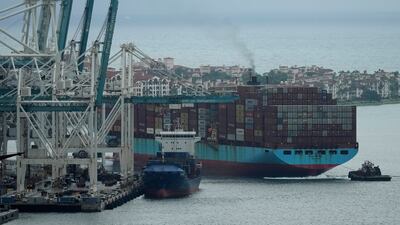The shipping industry on Wednesday was urged to treat the trillion-dollar challenge of eliminating its carbon footprint as a “tremendous opportunity” as it was told the public sector “can’t fund all” of its green needs.
A UK minister told maritime bosses meeting at International Shipping Week in London that they should invest in having “much less impact on the environment” while remaining “profitable and thriving”.
Shipping uses mainly diesel and contributes about 3 per cent of the world’s carbon emissions. The UN’s International Maritime Organisation (IMO) agreed in July to aim for net zero “by or around” 2050.
Various studies have estimated the cost of developing alternatives, such as hydrogen and low-carbon fuels, at more than $1 trillion.
The UK government this week allocated £80 million ($99.8 million) to green shipping projects, such as cruise ship terminals where vessels can be “plugged in” to run on electricity while docked.
But although there will “be some carrots” such as these, “the government can’t fund all of this”, Transport Secretary Mark Harper told hundreds of delegates at IMO headquarters in London.
“Private industry’s going to have to move in the right direction,” he said.
“The industry knows that it’s got to decarbonise, that it’s got to have much less impact on the environment. The big debate is how we do that in a way that also ensures that we [still have] vibrant industries.”
Discussions in London, which is home to many of the financiers and insurers who service global shipping, are also taking place under the cloud of the war in Ukraine. The resulting sanctions have affected global trade and sea lanes have come under threat during a period of high geopolitical tension.
The IMO’s outgoing secretary general, Kitack Lim of South Korea, described the 2050 climate goal as a “groundbreaking achievement” for the body amid steep “differences of perspective” among UN members.
The industry faces calls for a global carbon levy. New international regulations will take effect from January that give ships a carbon intensity rating from A to E, like a domestic appliance.
He said shipping was "undergoing a significant transformation" as it "grapples with the imperative of combating climate change while embracing the latest technologies".
"To achieve the net-zero goal, we must proceed with the implementation of the comprehensive measures in accordance with the adopted schedule," he said.
“A greener future holds tremendous opportunities for all."
The pressure is on major polluters to urgently switch to clean energy after a key UN report laying the groundwork for Cop28 in Dubai said the world was off track to limit global warming to 1.5ºC above pre-industrial levels.
Mr Harper said the push for clean energy in Britain had “been accelerated” by Russia’s invasion, which made it “not just a climate change issue” to look for alternatives to fossil fuel imports.
“There are lots more reasons now why people can see that decarbonising our energy production and fuel use in the transport system is actually the right thing to do,” he said.
A second minister, Nusrat Ghani from the Department for Business and Trade, said artificial intelligence could “change the dynamic” of decarbonisation. The government has suggested that AI could programme optimal shipping routes to save fuel.


